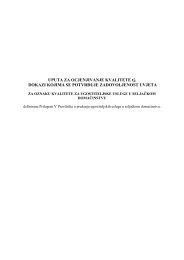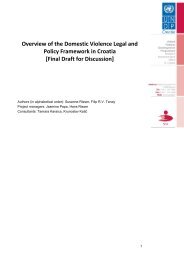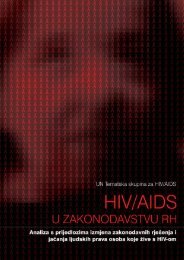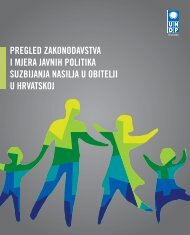WEB engleska verzija end.indd - UNDP Croatia
WEB engleska verzija end.indd - UNDP Croatia
WEB engleska verzija end.indd - UNDP Croatia
- No tags were found...
Create successful ePaper yourself
Turn your PDF publications into a flip-book with our unique Google optimized e-Paper software.
THE SOCIALLY EXCLUDEDCHAPTER 33.14.2 Access to HealthcareIn principle, sexual minorities have the same accessto health and educational institutions as all othercitizens. Still, in certain cases their participation and/or use of services is more difficult due to a lack ofunderstanding, intolerance or direct humiliation andabuse.In the case of medical examinations, the members ofsexual minorities often encounter “hetero-normative”expectations on the part of their doctors, which mayhave a negative impact on the quality of their diagnoses.This is especially true in urological, gynaecologicaland dermatovenerological practice. A similar problemappears in the field of psychiatry (see Box 20), wherecertain experts, mostly psychodinamically-orientedmembers of the older generation, continue to regardhomosexuality as a mental disorder.Due to current legislative regulation (Act on the Protectionof Patients’ Rights, 2004), a same-sex couplecannot make decisions for their partners when theyare unable to give (or deny) consent to a medicalprocedure, the way a married couple would. Hospitalpractices often go as far as to deny them access to themedical documentation of their partner. Recently,there have been efforts aimed at reducing the risk ofHIV among gay men in Zagreb.3.14.3 Access to EducationThe participation and success of young people witha different sexual orientation is difficult because ofthe absence of materials and sexual education programmesin the education system that could sensitisestudents to differences and promote tolerance. Thereare a number of personal experiences and testimoniesof students being bullied because they are suspectedof being homosexual or simply do not fit the g<strong>end</strong>ernorm (e.g., an “effeminate” young man and a “masculine”young woman). For example, in Zagreb a 15year old boy was psychologically tormented (he waslaughed at and isolated) and physically assaulted. 162Teachers and school administration do not alwaysrespond adequately to such cases.3.14.4 Access to Employment andEmployment ServicesIt seems that the low number of complaints againstdirect and indirect discrimination in the work placeis a consequence of many homosexual individualsfeeling forced to conceal their orientation from theircolleagues and superiors. ‘Coming out’ is extremelyrare, t<strong>end</strong>s to only happen in the case of peopleconstantly in the public eye, and for whom the riskof professional discrimination is minimized by theirmedia stardom.Officially recorded cases of direct and indirect discrimination,especially in seeking employment or atthe work place, are rare. The report prepared by theG<strong>end</strong>er Equality Ombudsman in 2005 records onlyseven complaints of discrimination based on sexualorientation (Bagić and Kesić, 2006). Judging from thefindings of a recently conducted qualitative research(<strong>UNDP</strong> <strong>Croatia</strong>, 2006), and taking into considerationthe fact that coming out is extremely rare in <strong>Croatia</strong>’sprofessional circles, it would appear that the lownumber of recorded cases of discrimination doesnot necessarily mean a low number of incidences.In light of this, the important question becomes towhat extent is the exclusion of these individuals theconsequence of the perceived risks of being openlyhomosexual. According to a 2005 study involving 202companies, one-third (32.7%) of those in charge ofmaking business decisions would not hire a personwho was openly homosexual. In another study, almostone-quarter (23%) of approximately one hundredpsychological experts responded affirmatively to thequestion whether the “coming out” of a colleaguewould result in “harassment at work” (Ženska soba/Women’s Room/ and LORI, 2006b).162 In late 2005, the management of the home took a series of measures with the purpose of protecting the adolescent, including aninvited topical lecture on young people’s sexuality.119

















